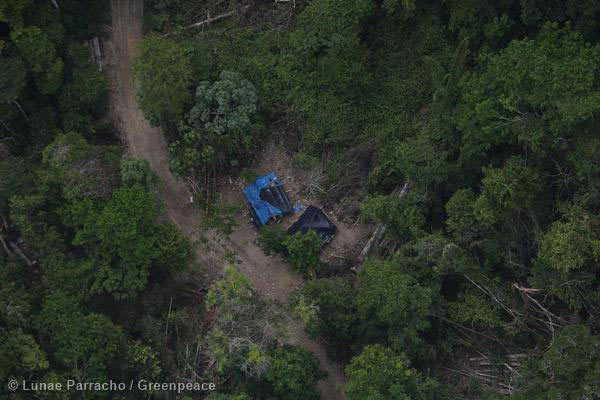These Activists are Risking Their Lives and Using High-Tech to Stop Illegal Logging in the Amazon
Jeremy Hance, Mongabay
Waking Times
Every night empty trucks disappear into the Brazilian Amazon, they return laden with timber. This timber —illegally cut —makes its way to sawmills that sell it abroad to places like the U.S., Europe, China, and Japan using fraudulent paperwork to export the ill-gotten gains as legit. These findings are the result of a daring and dangerous investigation by Greenpeace-Brazil that had activists hanging out with truckers and illegal loggers, all the while surreptitiously tagging trucks with GPS locator beacons. The high-tech equipment allowed the organization to track where the logging trucks went.
“Illegal logging can be hard to get to tackle. Logging happens deep in the forest, far from the eyes of the world,” reads a blog on the mission by Greenpeace. “But all that is changing. Covert GPS tracking technology and satellite surveillance means we can find out what loggers are really up to —and tell the world about it.”
The organization’s findings are published in a new report entitled Amazon’s Silent Crisis: Night Terrors, focusing on sawmills in Santarém in Pará. After tracking the trucks —which only move at night to avoid police scrutiny —the group followed up with satellite surveillance and even overflights to document how illegal loggers are still stripping the Amazon.
Odani sawmill in the middle of the Amazon. A new Greenpeace report alleges that this sawmill, and several others, are sourcing illegal timber. Photo by: © Greenpeace.
“The forests that [the trucks] visited are owned by the federal government and classified as public forest,” reads the report. “No authorization to log these areas had been granted. Logging in such circumstances is illegal under Brazilian law. Yet reconnaissance overflights of these areas revealed logging camps, access roads and clearings full of log piles.”
But how is illegal timber laundered into places like the U.S. and the EU, both of which now have laws against any company selling illegally-harvested timber from abroad?
According to the Greenpeace report, “loggers routinely submit applications to exploit land that they have no intention to log. Instead, they apply the credits they receive to timber stolen from elsewhere. This gives illegal timber a fake point of origin. Once laundered in this manner, illegal timber becomes indistinguishable from timber that has been harvested legally.”
This exposes a major hole in the process, allowing unscrupulous traders to go on illegal logging with impunity. The findings also put U.S. and EU companies at risk of legal action if they are supplied by these illegal loggers.
One company the Greenpeace report signals out is called Rainbow Trading. According to the activist group, Rainbow Trading says it is supplying 90 percent of its timber from five legal logging estates. But when the organization looked into the estates using satellite imagery “three showed no sign of logging, which suggests that their primary purpose is to provide the sawmill with the paperwork it needs to launder illegal timber logged elsewhere.” Timber taken by these night trucks go to one of Rainbow Trading’s sawmills and two others —Odani and Sabugy —that also supplies that company as well as others.
According to the Guardian, the activists anticipated government raids this morning on the illegal operations in the forest, acting on information they obtained.
This is the first time Greenpeace has used these tactics, and activists involved in these stealth operations likely risked their lives. Murder of environmental activists is a huge problem in Brazil. A recent report found that 448 environmental activists were murdered from 2002 to 2013 in the country, the highest of any nation in the world, and most of these are over land issues, such as illegal logging.
“Everyone is afraid of something sometimes. But, even with fear, we wanted to expose that official papers are worth nothing in proving the legality of Amazon timber,” an anonymous Brazilian involved in the investigation told the Guardian. “We were convinced the operation would bring strong evidence of this silent crisis affecting the Amazon and its people.”

Illegal Logging in Para State, Brazil. Photo by: © Greenpeace.
~~ Help Waking Times to raise the vibration by sharing this article with friends and family…
